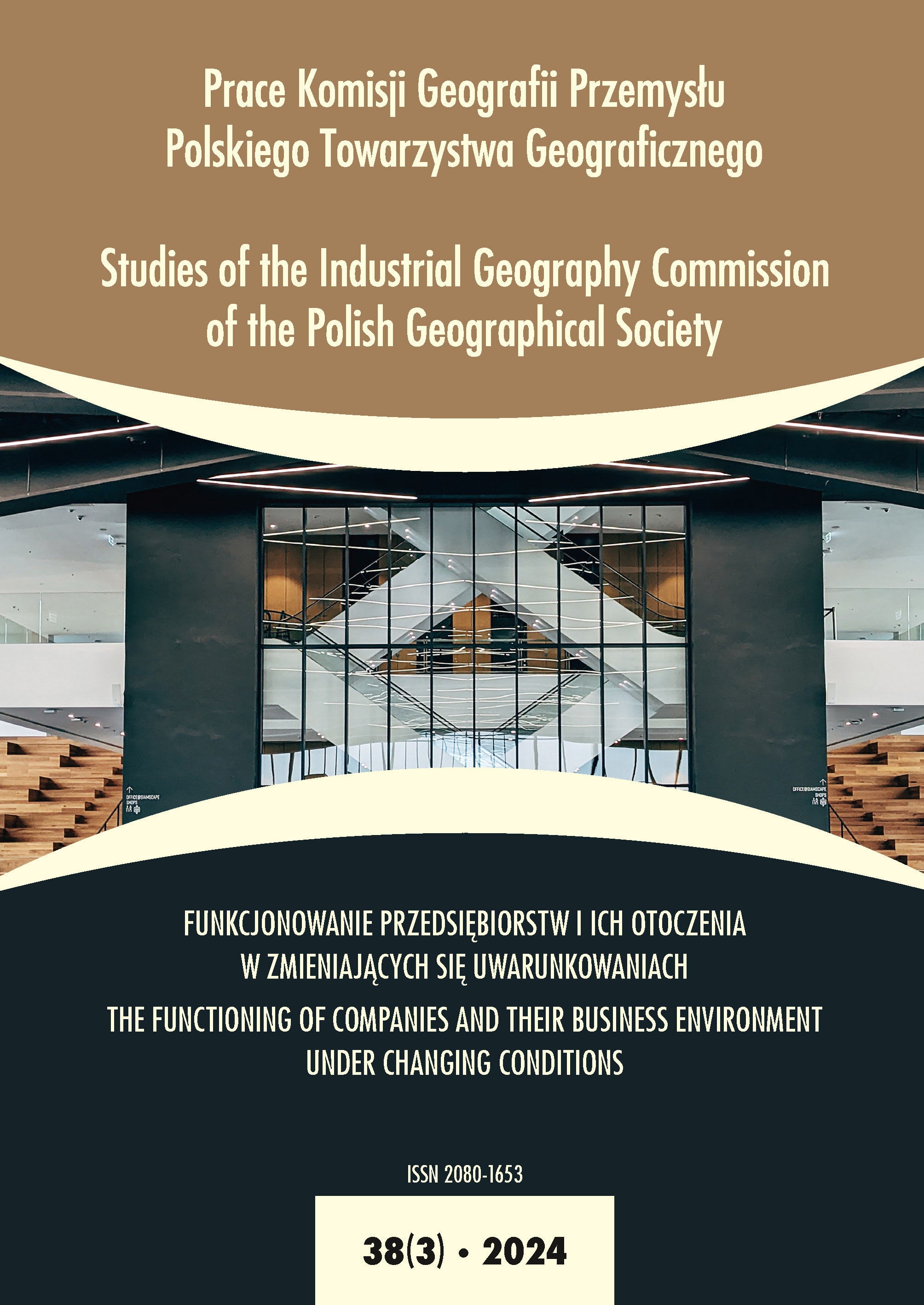Porozumienia przedsiębiorców jako sposób obrony przed kryzysem gospodarczym – szansa dla gospodarki czy naruszenie konkurencji?
DOI:
https://doi.org/10.24917/20801653.383.1Słowa kluczowe:
gospodarka, konkurencja, kryzys gospodarczy, porozumienie, przedsiębiorcaAbstrakt
Przedmiotem artykułu jest analiza porozumień przedsiębiorców jako formy obrony przed kryzysem gospodarczym. W kontekście tego zagadnienia wyłania się istotny problem badawczy, a mianowicie: czy można w pełni zaakceptować tego rodzaju porozumienia czy też należy je uznać za niedopuszczalne ze względu na ich destabilizujący wpływ na konkurencję? Problem ten jest omawiany na gruncie ustawy z dnia 16 lutego 2007 r. o ochronie konkurencji i konsumentów (tekst jednolity Dz.U. z 2024 r. poz. 594 z późn. zm.). W związku z tym główną zastosowaną metodą badawczą jest metoda dogmatyczna z uwzględnieniem wybranych aspektów ekonomicznych. Cele szczegółowe opracowania sprowadzają się do odpowiedzi na trzy pytania badawcze: jakie porozumienia przedsiębiorców są zabronione, czy każde porozumienie ograniczające konkurencję jest zakazane, jakie są konsekwencje zawarcia porozumienia niezgodnego z ustawą o ochronie konkurencji i konsumentów? W artykule przyjęto hipotezę, że możliwość zawierania przez przedsiębiorców porozumień – jako sposób ochrony przed kryzysem gospodarczym – jest ograniczona. Wywody zawarte w artykule potwierdziły trafność tej hipotezy. Pozwoliły też sformułować rekomendacje pod adresem ustawodawcy. Po pierwsze, należy zwiększyć wskazane w art. 7 ust. 1 pkt 1 i 2 wspomnianej ustawy górne limity udziałów w rynku właściwym posiadanych przez przedsiębiorców, którzy są stronami porozumienia, zwalniające ze stosowania części zakazów ujętych w art. 6 ust. 1 tej ustawy (zob. także art. 7 ust. 3 wyszczególniający porozumienia zakazane niezależnie od udziałów przedsiębiorców w rynku właściwym). Po drugie, istnieje potrzeba złagodzenia kary finansowej określonej w art. 106 ust. 1 pkt 1 rzeczonej ustawy przez ustalenie maksymalnej kwoty kary w każdym przypadku jej nałożenia (przykład takiego ograniczenia znajduje się w art. 106 ust. 6 tej ustawy).
Downloads
Metrics
Bibliografia
Bator, A. (2015). Postanalityczna teoria i filozofia prawa. Nowe szanse, nowe zagrożenia? W: M. Jabłoński, M. Paździor (red.), Postanalityczna filozofia prawa. Przegląd Prawa i Administracji, CII (Acta Universitatis Wratislaviensis No 3662). Wrocław: Wydawnictwo Uniwersytetu Wrocławskiego, 21–44.
Fornalczyk, A. (2007). Strategie konkurencyjne przedsiębiorstw i ochrona rynku przed skutkami dominacji rynkowej. W: C. Banasiński, E. Stawicki (red.), Konkurencja w gospodarce współczesnej. Warszawa: Urząd Ochrony Konkurencji i Konsumentów, 80–91.
Hykawy, I., Wojtaszek, E. (1994). Regulacja porozumień ograniczających konkurencję w prawie Wspólnoty Europejskiej. Przegląd Prawa Handlowego, 11, 1–13.
Jurkowska, A., Miąsik, D., Skoczny, T., Szydło M. (2007). Nowa uokik z 2007 r.: krytyczna analiza niektórych rozwiązań. Przegląd Ustawodawstwa Gospodarczego, 5, 13–21.
Jurkowska, A., Skoczny, T. (2008). Wyłączenia grupowe spod zakazu porozumień ograniczających konkurencję we wspólnotowym i polskim prawie ochrony konkurencji. W: A. Jurkowska, T. Skoczny (red.), Wyłączenia grupowe spod zakazu porozumień ograniczających konkurencję we Wspólnocie Europejskiej i w Polsce. Warszawa: Wydawnictwo Naukowe Wydziału Zarządzania Uniwersytetu Warszawskiego, 27–74.
Jurkowska‑Gomułka, A. (2014). W: T. Skoczny (red.), Ustawa o ochronie konkurencji i konsumentów. Komentarz. Warszawa: Wydawnictwo C.H. Beck.
Jurkowska‑Gomułka, A. (2017). Konkurencja a przetargi – konieczność wielowymiarowego podejścia. Przegląd Ustawodawstwa Gospodarczego, 1, 2–10.
Kohutek, K. (2014). W: K. Kohutek, M. Sieradzka, Ustawa o ochronie konkurencji i konsumentów. Komentarz. Warszawa: LEX a Wolters Kluwer business.
Konstytucja Rzeczypospolitej Polskiej z dnia 2 kwietnia 1997 r. (Dz.U. z 1997 r. nr 78, poz. 483 z późn. zm.).
Kowalski, J. (1984). Wstęp do prawoznawstwa. Warszawa: Państwowe Wydawnictwo Naukowe.
Kowalski, J., Lamentowicz, W., Winczorek, P. (1986). Teoria państwa i prawa. Warszawa: Państwowe Wydawnictwo Naukowe.
Księżyk, M. (2009). Ekonomia. Kraków: Uczelniane Wydawnictwa Naukowo‑Dydaktyczne AGH.
Materna, G. (2013). Zakres podmiotowy zakazu zmów przetargowych w polskim prawie ochrony konkurencji i prawie karnym. Przegląd Ustawodawstwa Gospodarczego, 12, 4–13.
Noga, A. (1993). Dominacja a efektywna konkurencja. Warszawa: Oficyna Wydawnicza Szkoły Głównej Handlowej.
Nowak, L. (1973). Interpretacja prawnicza. Studium z metodologii prawoznawstwa. Warszawa: Państwowe Wydawnictwo Naukowe.
Smaga, M. (2024). Cykl koniunkturalny. W: T. Włudyka, M. Smaga, M. Porzycki (red.), Instytucje gospodarki rynkowej. Warszawa: Wolters Kluwer Polska Sp. z o.o., 202–205.
Stawicki, A., Stawicki, E. (2016). W: A. Stawicki, E. Stawicki (red.), Ustawa o ochronie konkurencji i konsumentów. Komentarz. Warszawa: Wolters Kluwer SA.
Szanciło, T. (2006). Porozumienia ograniczające konkurencję. Przegląd Prawa Handlowego, 8, 36–43.
Tomczak, A. (2007). Rozdział 21. Koniunktura gospodarcza. W: S. Marciniak (red.), Makro- i mikroekonomia. Podstawowe problemy. Warszawa: Wydawnictwo Naukowe PWN, 450– 475.
Ustawa z dnia 16 lutego 2007 r. o ochronie konkurencji i konsumentów (tekst jednolity: Dz.U. 2024 r. poz. 594 z późn. zm.).
Ziembiński, Z. (1980). Problemy podstawowe prawoznawstwa. Warszawa: Państwowe Wydawnictwo Naukowe.
Pobrania
Opublikowane
Jak cytować
Numer
Dział
Licencja
Prawa autorskie (c) 2024 Prace Komisji Geografii Przemysłu Polskiego Towarzystwa Geograficznego

Utwór dostępny jest na licencji Creative Commons Uznanie autorstwa – Bez utworów zależnych 4.0 Międzynarodowe.
Artykuły publikowane są zgodnie z warunkami licencji Creative Commons (CC BY-ND 4.0; uznanie autorstwa-bez utworów zależnych).

